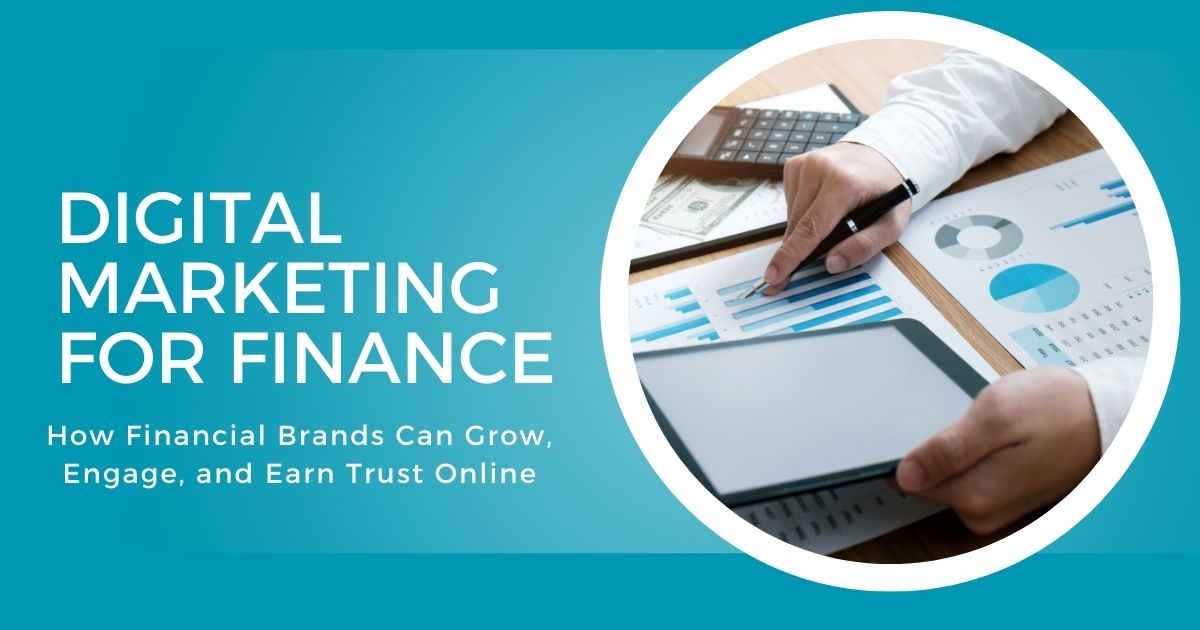
Digital marketing for finance is essential for building trust, engaging customers, and staying competitive in today’s digital-first financial landscape. By leveraging strategies like SEO, content marketing, email, social media, and data analytics, institutions can deliver personalized and meaningful experiences. Adapting to changing consumer behavior and fintech-driven expectations ensures long-term growth and stronger client relationships.
Why Digital Marketing Matters for Financial Services

Massive leaps in technology over the past decade have transformed the way financial services connect with their customers. Today, consumers research, compare, and even complete financial transactions entirely online, making digital channels a critical touchpoint. Traditional marketing methods, such as print ads or cold calling, no longer capture attention effectively—especially among younger, digitally native audiences who expect personalized, seamless, and transparent experiences.
Digital marketing for finance allows institutions to meet these expectations while building trust and credibility. It provides the tools to reach the right audience with the right message at the right time, using data-driven insights to optimize campaigns. Beyond acquisition, it enables financial brands to engage customers throughout their lifecycle, delivering educational content, timely updates, and personalized recommendations that strengthen relationships. In an increasingly competitive market, leveraging digital marketing effectively is no longer optional—it is essential for survival, growth, and long-term customer loyalty.
Financial services firms have their own particular set of challenges that other industries don’t face. Old-school marketing and advertising does not resonate with today’s empowered consumers, particularly younger consumers who don’t have the same trust in financial sources as older generations. Here’s why having a solid digital marketing strategy is essential:
- Customer demands: Today’s consumers expect personalized, seamless and easy-to-use digital experiences from even the most complex services, such as mortgage lending or wealth management.
- Competitive landscape: Fintech startups have set up a gold standard for digital experiences. Legacy financial institutions must disrupt to survive.
- The value of trust: Financial relationships are very personal. A well-managed digital marketing plan is in charge of creating the confidence and certainty in the customers.
- Data advantage: Digital media give companies data they can use to customize services and messaging to target segments of their potential audience.
Essential Elements of a Successful Financial Services Digital Marketing Plan

Understand Your Audience
You need to start with a strong insight into your target market. Who is your perfect client and what are their financial needs? Consider these practical steps:
- Segment by persona: Develop audience personas based on different types of customers, such as first-time homebuyers, high-net-worth investors or small business owners.
- Audience Polling: Conduct surveys or interviews or focus group discussions to gather valuable information on frustrated customer services.
- Use analytics: Use website and social media analytics to better understand how people are using and responding to content.
Build a SEO-Optimized Website
The foundation of any successful digital marketing strategy for finance is a deep understanding of your audience. Knowing who your ideal client is and what their financial needs, goals, and challenges are allows you to craft messages that truly resonate. This goes beyond basic demographics—it involves understanding their behavior, preferences, and the digital channels they use to research and make financial decisions.
For example, first-time homebuyers may prioritize guidance on mortgages and saving strategies, while high-net-worth investors might seek sophisticated wealth management insights. Small business owners may focus on funding options, cash flow management, or insurance solutions. By developing detailed audience personas and leveraging surveys, interviews, or focus groups, financial marketers can gain actionable insights into pain points, motivations, and expectations. Combining this qualitative understanding with website and social media analytics provides a comprehensive view of customer behavior, enabling more precise targeting, personalized content, and campaigns that deliver real engagement and results. Consider the following:
- Responsive design: Your website has to be mobile-friendly with an increasing number of people consuming financial content on their phone.
- Quick loading speed: Slow page speed can be annoying and prompt visitors to leave your site Multiply your income and get traffic to your blog in minutes.
- SEO tactics: Create optimized webpage around focus keywords as “best financial planning tools”, “Business loans for startups” or “retirement investment strategies” to attract organic traffic.
- Add trust factor: Certificates, testimonials and security badges build confidence to trust you as a legit website.
Leverage Email Marketing
Email marketing remains one of the most powerful and cost-effective tools in digital marketing for finance due to its directness, scalability, and ability to deliver personalized communication. Unlike social media, which can be fleeting, email allows financial institutions to maintain ongoing relationships with both prospects and existing clients, providing timely updates, educational content, and targeted offers.
The effectiveness of email campaigns in finance depends on relevance and personalization. By using audience insights and behavioral data, institutions can tailor messages to match a recipient’s life stage, financial goals, or recent interactions. For example, a client researching retirement planning may receive emails with investment tips, calculators, or relevant webinars, while a small business owner might get insights on funding options or cash flow management. Automation further enhances efficiency, enabling brands to trigger emails based on specific actions—such as newsletter sign-ups, abandoned applications, or milestone achievements—ensuring the right content reaches the right audience at the right time. When executed thoughtfully, email marketing not only drives conversions but also strengthens trust, positions the institution as a knowledgeable advisor, and fosters long-term engagement. Here’s how to get the most out of it:
- Personalized is powerful: Utilize audience insights to offer personalized offers.
- Emphasize value: Include informative content such as market updates, saving tips, or financial planning tools.
- Automation: Create on-behavioral workflows depending on the stage of a customer funnel.
Enhance Your Social Media Presence

Social media is a powerful tool in digital marketing for finance, allowing brands to humanize themselves and build real connections with customers. Unlike traditional advertising, social platforms enable two-way communication, making it easier to share insights, answer questions, and demonstrate expertise. However, many financial services companies struggle to use social media effectively, often balancing compliance requirements with engaging content.
To stand out, it’s important to focus on strategy and relevance. Choose the right platforms—LinkedIn for B2B audiences, Instagram or Facebook for broader consumer reach—and share content that educates and informs, such as explainer videos, infographics, and success stories. Engaging actively with followers through comments and messages builds trust and strengthens community. When done thoughtfully, social media can transform from a marketing channel into a platform for establishing credibility and nurturing long-term customer relationships. Here’s how you can stand out:
- Choose the right platform: LinkedIn for B2B; Instagram/Facebook for broader consumer reach.
- Develop content that matters: Distribute infographics, explainer videos, and success stories.
- Building a community: Create a relatable presence and engage your community in comments and messages.
Implement Paid Advertising Campaigns
Paid advertising is a key part of digital marketing for finance, helping institutions reach targeted audiences quickly and at scale. Search ads capture users actively looking for financial solutions, social media ads allow precise targeting based on demographics and interests, and retargeting reconnects with visitors who have previously engaged with your content.
When done strategically, paid campaigns boost visibility and generate high-quality leads. Clear, transparent messaging that aligns with compliance standards reinforces trust while driving measurable results, ensuring every campaign contributes to both growth and credibility. Popular options include:
- Google Ads: Use search ads for finance-related terms to generate quality traffic.
- Social media advertising: Promote deals or content to targeted users.
- Retargeting: Re-attract leads by displaying ads based on prior visits.
Create Trustworthy Content Marketing
Content marketing is essential in digital marketing for finance, helping brands build authority, educate customers, and demonstrate value. Blogs, guides, videos, and interactive tools like calculators simplify complex financial concepts and provide actionable insights.
High-quality content also delivers measurable ROI. By tracking engagement and conversions, financial institutions can refine strategies, establish thought leadership, and nurture long-term trust. Over time, this approach turns potential clients into loyal advocates while strengthening the brand’s credibility in the financial market. Especially in financial services where trust is so important:
- Educational resources: Share blog posts, guides, or whitepapers.
- Videos and webinars: Offer financial literacy sessions or explainers.
- Interactive tools: Provide mortgage calculators or savings estimators.
Leverage Data Analytics to Promote Ongoing Improvement

Tracking tools like Google Analytics, HubSpot, or Adobe Analytics make it clear if your campaigns have been successful. Be sure to monitor:
- Website traffic and engagement rates
- Ad and landing page conversion rates
- Email stats such as open and click-through rates
- Social media metrics like likes, shares, and follower growth
The Rise of Fintech and Its Impact on Digital Marketing for Finance
The rapid growth of fintech companies has fundamentally reshaped customer expectations across the financial sector. These digital-first challengers have set new benchmarks for speed, convenience, and transparency by offering seamless onboarding processes, intuitive mobile experiences, and clear, jargon-free communication. As a result, traditional banks, insurers, and investment firms are under increasing pressure to modernize not only their services, but also the way they market them. Digital marketing for finance is no longer focused solely on brand awareness; it now plays a critical role in demonstrating innovation, usability, and customer-centric thinking.
Fintech brands have also changed how consumers evaluate financial providers. Customers now expect real-time support, personalized digital interactions, and easy access to information before making financial decisions. This shift has forced legacy institutions to move beyond conservative messaging and adopt more engaging, educational, and experience-driven marketing strategies. Digital marketing for finance must now clearly communicate how products simplify life, solve real problems, and deliver value in a fast-moving digital world.
To remain competitive, established financial brands must strike a balance between their long-standing credibility and the agility of fintech competitors. Highlighting advanced security measures, regulatory expertise, and financial stability while embracing modern digital practices allows institutions to differentiate themselves effectively. By showcasing technological innovation, streamlining communication, and focusing on customer experience, financial organizations can meet fintech-driven expectations while reinforcing the trust that remains their greatest advantage.
Adapting Digital Marketing for Finance to Changing Consumer Behavior
Consumer behavior in finance is evolving rapidly, shaped by technology, economic shifts, and changing life priorities. Today’s customers are more informed and digitally savvy, expecting personalized experiences and seamless online interactions. Static campaigns no longer resonate, making flexibility essential in digital marketing for finance.
Successful financial marketers monitor engagement, analyze behavior patterns, and adjust messaging to stay relevant. Younger audiences may prefer interactive tools or videos, while high-net-worth clients respond better to in-depth reports or webinars. Additionally, market changes and life events, such as buying a home or planning retirement, influence customer decisions. By staying adaptive and data-driven, financial brands can deliver timely, meaningful interactions that build trust and foster long-term loyalty.
The Path of Success in Marketing Your Business Online
Digital marketing is no longer a nice to have in financial services. From building trust and fostering relationships to using data more intelligently to ensure better decision making, it’s about engaging with customers in a meaningful way.
Following the strategies described above, you may not only catch up but redefine your audience’s engagement with your brand.
Developing a strong digital marketing strategy is crucial for financial services firms aiming to stay competitive, and pursuing a marketing analytics certificate can further enhance your ability to make data-driven decisions that support those strategic goals.
Frequently Asked Questions (FAQ)
Why is digital marketing especially important for the finance industry today?
Digital marketing for finance is essential because consumer behavior has shifted heavily toward online research and decision-making. Customers expect convenient digital experiences, transparent information, and personalized communication, even for complex financial products.
How can smaller financial firms compete with large banks through digital marketing?
Smaller firms can compete by focusing on niche audiences, educational content, and personalized experiences. Digital marketing for finance allows targeted outreach and relationship-building without the massive budgets traditionally required for offline advertising.
Is SEO really effective for financial services websites?
Yes, SEO is highly effective when done correctly. Many users actively search for financial advice, products, and comparisons online. Optimized content helps financial institutions capture high-intent traffic while establishing authority and trust.
How do regulations impact digital advertising for financial services?
Regulations influence everything from ad copy to data usage. Digital marketing for finance must ensure transparency, accurate claims, and proper disclosures. Brands that prioritize compliance build stronger trust and avoid costly legal risks.
What role does data analytics play in financial digital marketing success?
Data analytics helps financial institutions understand customer behavior, measure campaign performance, and optimize strategies. In digital marketing for finance, analytics supports better targeting, improved personalization, and smarter long-term decision-making.


Leave a Reply